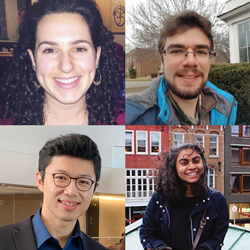WED@NICO WEBINAR: Lightning Talks with Northwestern Fellows and Scholars!

When:
Wednesday, February 2, 2022
12:00 PM - 1:00 PM CT
Where:
Online
Webcast Link
Audience: Faculty/Staff - Student - Public - Post Docs/Docs - Graduate Students
Cost: Free
Contact:
Emily Rosman
(847) 491-2527
nico@northwestern.edu
Group: Northwestern Institute on Complex Systems (NICO)
Category: Academic, Lectures & Meetings
Description:
Webinar:
Webinar link: https://northwestern.zoom.us/j/94393609745
Passcode: NICO2022
Speakers:
◦ Melissa Manus, PhD Candidate, Department of Anthropology, Weinberg College of Arts and Sciences
Ecological and environmental determinants of the infant microbiome
The microbiome mediates the effect of early life environments on myriad aspects of infant physiology and health, including immune system function. More specifically, factors in both the physical and social environment, including contact with other people, help to diversify infants' exposures to commensal microbes. An ecological perspective suggests that the development of the infant microbiome is influenced by behaviors and lifestyle practices that spread microbes to different niches across the infant body. This talk will highlight ongoing research on the infant skin microbiome, with an emphasis on the utility of an ecological approach for studying the effect of early life factors on various microbial communities across the body.
◦ David Sabin-Miller, PhD Candidate, Engineering Sciences and Applied Mathematics, McCormick School of Engineering
Randomness Inside Nonlinear Dynamics
Many real-world systems have random or rapidly varying quantities of interest. For instance, a particle suspended in a gas exhibits so-called Brownian motion from many effectively-random kicks by neighboring particles. But in modeling continuous-time complex systems we might encounter such an unknowable/rapidly-varying quantity which has a nonlinear effect, and there has been no mathematically consistent way to interpret how such a system might behave. We propose a generalized definition which bridges the gap from this problem to existing theory, and enables the simulation and analysis of a broad new class of systems.
◦ Dawei "David" Wang, PhD Candidate, Management and Organizations, Kellogg School of Management
"Animal Prints" and How the Loss of Privacy Continues
While big-tech companies are stopping the use of facial recognition technology and deleting millions of facial templates of their users, previous research has consistently shown that digital traces can help reveal people's sensitive traits in online posted media sources. In this study, I show that using models not trained on the biometrics information of the facial images can be repurposed to accurately classify people's demographic information, thereby posing a severe threat to people's privacy. Because users do not randomly upload images, digital traces of their behavioral tendencies can be consistently found in their online images. Thus, even without the help of facial recognition technology or methods to detect the biometrics of the users, traits, such as the gender, age and race can be accurately predicted from the images. This study hope to warn policy makers on the continued danger of privacy loss even with stricter regulations in facial recognition and biometric technology.
◦ Priyanka Nanayakkara - PhD Student, Technology and Social Behavior, School of Communication and the McCormick School of Engineering
Visualizing Privacy-Utility Trade-offs in Differentially Private Data Releases
Organizations often collect private data and release aggregate statistics for the public's benefit. If no steps toward preserving privacy are taken, adversaries may use released statistics to deduce unauthorized information about the individuals described in the private dataset. Differentially private algorithms address this challenge by slightly perturbing underlying statistics with noise, thereby mathematically limiting the amount of information that may be deduced from each data release. Properly calibrating these algorithms---and in turn the disclosure risk for people described in the dataset---requires a data curator to choose a value for a privacy budget parameter, epsilon. However, there is little formal guidance for choosing epsilon. We present Visualizing Privacy (ViP), an interactive interface that visualizes probabilistic relationships between epsilon, accuracy, and disclosure risk to support setting and splitting epsilon among queries. Through an evaluative user study (N=16), we find that ViP helps participants more correctly answer questions related to judging the probability of where a noised release is likely to fall and comparing between noised and non-private confidence intervals. (full paper)
About the Speaker Series:
Wednesdays@NICO is a vibrant weekly seminar series focusing broadly on the topics of complex systems and data science. It brings together attendees ranging from graduate students to senior faculty who span all of the schools across Northwestern, from applied math to sociology to biology and every discipline in-between. Please visit: https://bit.ly/WedatNICO for information on future speakers.
About Lightning Talks:
NICO Lightning Talks are typically held once each term, giving Northwestern scholars the opportunity to present their research to the NICO community. Open to NU graduate student or postdoctoral fellows! Please sign up here if interested: https://bit.ly/nico-lightning. The next session will be in either April or May 2022.